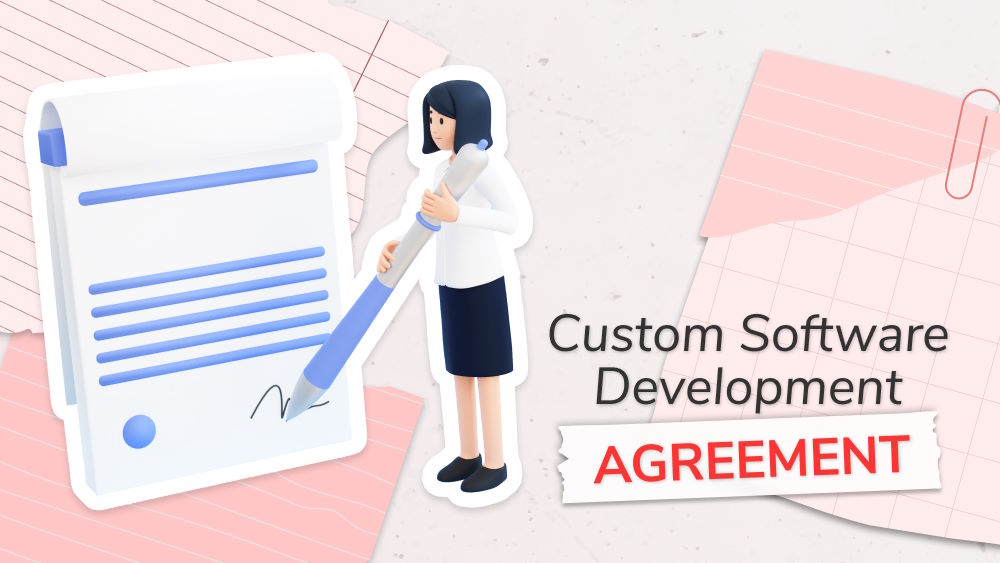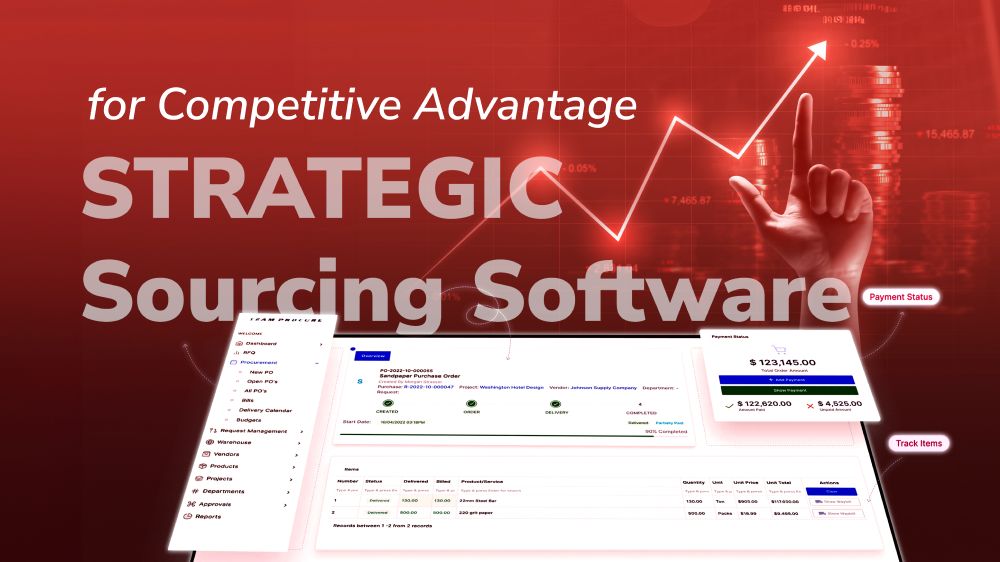Custom Software Development Agreement: An Overview of Different Types

Content Map
More chaptersThe business landscape is now driven by technologies and digitalization, so reasonably, the success of modern companies of any size and shape hinges on how agile and adaptable they are to transform technologically. This boosts businesses to streamline operations, increase agility, reduce cost, automate processes, and heaps more benefits.
Indeed, the inclusion of technologies and software tools tailored to particular requirements in the business environment has become a norm for most companies across every industry. While it is a competitive advantage to develop a custom software product for a particular purpose, it leaves business owners the puzzles to solve when it comes to who will develop it, how much it is going to cost, and what are the risks of the arrangement.
For such reasons, custom software development services are a go-to strategy for most companies, both tech and non-tech ones, to leverage third-party materials and have their needs handled by a full-fledged development team. At the end of 2023, the total spending on IT outsourcing services will reach $519 billion, which will be 22% higher than in 2019. Statistics by Precedence Research indicate that the global market for software outsourcing is projected to soon attain a worth of approximately $1.06 trillion by 2030.
Before the development process of custom software can hit the ground running, business owners and service providers first need to come to terms with a legitimately binding contract between the two parties involved in the project. A software development agreement is a cornerstone for any successful project, and it should be carefully crafted to make sure all parties in the project are on the same page. Here’s an overview of various contract types and what you must not miss in your software development agreement.
Available Types of Software Development Contracts

On your way toward building and managing a strong, long-lasting partnership with a software development company, the presence of a comprehensive agreement is of utmost necessity. The custom software development contract not only means the legitimately binding document consented to by the software developer (service provider) and the client (service user) but also a commitment in terms of fair rights, duties, and other obligations. It serves as a compass to ensure the working relationship is clear and transparent, proceeding in the right direction and mitigating the percentages of risks to the fullest.
When it comes to outsourcing, you have different business models to choose from. As such, the nature of your outsourcing contract will vary according to your decision. In other words, software development agreements are not the same in every case, and there are several types. Each type differs by the business’s particular purpose, budget, timeline, and other factors, which play a critical part in deciding services and resources agreed upon in the contract.
Time and Material Contract
The first and also most popular sort is the time and material agreement in which outsourcing vendors bill their clients at an hourly rate, and the cost also covers any materials consumed in the development process or repair process (if any). The time and materials approach is advantageous for companies that need custom software without predetermined software specifications or project timelines. Given the flexibility, the client and the other party can reactively make adjustments while the project lifecycle progresses. The service users can add or reduce resources, change the project scope, and modify due dates if needed.
Due to the nature of this arrangement, a time and materials contract should contain an agreement of the total cost estimated for the project, the list of services to be provided, along with a breakdown of the hourly rate, payment schedule, and any other relevant expenses. Unfortunately, this approach can be quite risky to service users, as it might lead to overextended payments and budgets when the project scope changes too often, or additional resources incur unexpectedly.
Fixed Price Contract
Such custom software development contracts hinge on project cost and budget predictability. The total cost of developing a piece of custom software comprises many components, namely consulting costs, licensing fees, labor expenses, deployment costs, support services, and project management. And all will be negotiated and decided beforehand, with professional advice from the experts, to ensure that all is set when the project hits the ground running.
Also known as the fixed budget contract, this type of agreement is the most preferred one for custom software development projects in which businesses have predefined specifications and know in advance what they need precisely from the service vendor. In this working relationship, both parties are required to agree on a fixed price for software development services and all relevant fees included, regardless of how much time is spent working on the project or the number of resources consumed.
A fixed-budget contract will secure your project requirement changes from interfering with the overall cost and timeline agreed upon by both parties in advance. This type of agreement should contain all the details related to the project description, timeline, cost, payment structure, service-level agreement, and other provisions.
Fixed Bid Contract
The fixed-bid contract is similar to the fixed-price agreement, but there are distinct differences. In this business model, all parties define and agree on a set of services provided by the software development company in advance before signing the contract. And then, based on that list of service requirements, each party will estimate the cost and establish a rate for payment. Once it is agreed upon by both parties, they will sign the contract.
The client (the service user) typically pays for the services in full after all activities are completed. Because of the nature of such an agreement, there could be a higher risk for business owners when changes occur before project completion. As such, it is essential to have a contingency plan in place to protect both parties during the entire contract and development process. The contract should also include a list of services, terms and conditions, payment schedule, and other relevant information necessary for project delivery.
Dedicated Team Contract
Businesses that require a dedicated software team of developers for the development of their custom software should opt for this type of contract. The service user will negotiate with a software development company and allocate a group of specialists to work on their project.
This sort of collaboration can be beneficial because it gives control over the entire process, including budgeting, planning, scheduling, resource allocation, and other tasks. Also, this type of arrangement works best for companies that need extensive development assistance, as it ensures there is always a team of developers available to respond to any changes in the project quickly. This is considered one of the most optimal solutions to the shortage of IT personnel.
The dedicated team contract should include the list of services provided, price estimation, project timeline and delivery dates, payment schedule, software development process methodology (Waterfall or Agile methodology), service-level agreement (SLA), and other relevant details. The parties can also negotiate for further flexibility if needed. Perfecting this document will help to make certain that both parties are on the same page regarding project development, timelines, and cost.
Overall, each type of software development agreement comes with its own advantages and disadvantages. Service users should weigh all options before entering into a contract for custom software development services. Professional advice from an experienced software development company can also help you make the right decision and ensure successful project completion.
Go Through This Checklist to Ensure a Software Development Contract Is Enforceable

Before the development process begins, a formal agreement between the client and vendor must be signed that states all applicable terms and conditions, whatever type you choose. No doubt, you will need to verify all the vital elements of a contract before signing. At a minimum, a custom software development agreement must cover all the provisions made and committed by both parties, so make sure to include the following:
Service & Resources Provided
According to the project scope and requirements agreed upon initially, the contract describes the nature and level of services to be provided as well as resources allocated for the development. This section should also include the total estimated cost for completing the project and lay down a structure of personnel and equipment needed.
Moreover, terms of time and location for service delivery should be clearly stated, whether it is on-site or off-site. At this point, both contractor and client must have a keen eyes for details to make sure everyone is on the same page and everything is in the correct order.
Quality Acceptance Criteria for Services & Deliverables
Of course, acceptance testing and quality assurance are of utmost importance to any project in order to ensure the desired standards are met. The final outcomes must go through several quality gates and pass tests before acceptance.
Hence, an agreement should include specific guidelines appointing the performance expectations, quality standards, and compliance requirements, generally called the success criteria. These principles serve as the conventional benchmark and measure the performance of both parties to refer back to for any discrepancies. A software product is only marked completed after meeting all the criteria, nothing less. Due to the importance, vendors and customers must collaborate to develop measurable yet achievable development metrics close to their business goals and objectives.
Delivery Dates & Deadlines
Having a timeline established for the project delivery is essential, and it should be written down in the contractual document. It outlines activities and stages that should be completed within a given time frame. Aside from the overall project timeline, it should also contain milestones and deadlines along with their associated tasks. Scheduling each task and setting a timeline can help both sides stay on track and define the objectives that need to be achieved at each stage.
When there is an agreed-upon timeline, both parties will have a clear view of the project’s progress and the responsibilities they are expected to deliver. This section should also include the rules and regulations related to any delays or disruptions that could occur during development, such as force majeure clauses and penalty fees if necessary.
Contract Variation Management Process
In reality, adjustments are inevitable, so it is essential to have a change management procedure in place for the software development contract. Even though the client may not be able to predict all the alterations they may deal with, it is still a good idea to list any potential modifications in the agreement. This could include revisions made to design specs, coding requirements, features, and functions requested by the client, as well as timelines for the completion of tasks. Thus, both sides of the contract need to be well aware of when and how changes can be made during the development process.
Additionally, include details on how the costs incurred due to these changes will be handled, including any additional fees that may need to be paid. This section should also clearly explain the responsibilities of both parties in case of changes and who is responsible for taking care of those charges.
Confidentiality & Non-Disclosure Agreement (NDA)
As stipulated in the contract, the NDA or Confidentiality Agreement prevents either party from revealing any confidential information, such as trade secrets, source codes, customer data, or else, both with or without intention. It ensures that the client’s intellectual property is maintained and protected, as well as not disclosed to a third party without permission. This provision must be clarified and noted down in the agreement, and there will be legal implications if violated, such as penalties or contract termination.
Intellectual Property Rights
Ownership of the developed product must be explicitly stated in the contract, and it should include all rights, including patents, trademarks, trade secrets, copyrights, etc. This section specifies who owns the intellectual property and under what circumstances it can be used, such as modification and distribution. The software product ownership will be transferred to the client as soon as it is completed and the final payment is made.
As a service buyer, you need to know what rights and privileges you are entitled to once the project is finished, so make sure to discuss it with the contractor before signing the contract. These details must be addressed in advance to avoid any disputes down the line. In case of copyright infringements or any other intellectual property interest violation, penalties or legal action may be taken.
Payment Terms & Warranty
In a detailed manner, the payment terms and conditions must be discussed and documented in the software development contract. All the provisions concerning payment need to be approved before making their way into the agreement, such as duration of payments, whether it is a fixed price or charged hourly/daily rate, currency exchange rate applicable during the project span, when payments are expected to be received after tasks are completed, etc.
Depending on the size of the project, the remuneration can be split into several milestones or made full at once. Also, the contract will point out who is responsible for any taxes incurred due to the project and address other related financial commitments.
Moreover, warranty provisions must also be present in the contract as it defines the period of time and what types of services are covered under it. It is your responsibility to make sure you have read this section thoroughly so that any damage or other issues during the project’s lifetime can be taken care of.
Maintenance & Support Services
In addition to the warranty mentioned above, it is also essential to include details about the maintenance and support services provided. If there is any bug, glitch, or issue after completing the project, the supplier must address them in a timely manner and be available to resolve them as soon as possible. These are the rightful after-sales services you are offered when outsourcing your custom software solutions. So, they must be confirmed on paper, not in a verbal agreement.
In addition, no ambiguous situations can arise due to a lack of clarity in this section unless you do not discuss the fee structure for ongoing support and maintenance as well as other additional services requested from the service company.
Dispute Resolution & Exit Strategy
No two parties involved in the project can agree on everything during its lifetime, so confusion, argument, or disagreement inevitably occurs. In such cases, it is crucial for contractors and clients to add a dispute resolution clause to the agreement. Such a clause contains instructions on what to do when either party experiences a problem or disagreement regarding the project. It also explains how grievances will be handled and what type of dispute resolution process will be taken, such as retrospective, arbitration, or legal action.
Having an exit strategy also needs to be included in the software development contract. This part of the agreement defines how either party can terminate the project and what kind of consequences or obligations they will need to accept after ending the contract. This is important to ensure that both parties are aware of their rights in case they want to end the agreement before it is completed.
Furthermore, this section should also include information on who will own the source code and design documents, how data will be handled upon exit, and any additional clause depending on the project’s needs.
Sum-up

There can be different types of custom software development agreements depending on the project’s scope, size, and needs. The more detailed and comprehensive they are, the better it is for both parties involved. Make sure to include all of the above-mentioned clauses in your contract for a smooth and successful collaboration. Don’t forget to go over the contract’s key points again and again until you find no concerns before signing it.
Need consultancy for software outsourcing services? Orient Software is here to help you. As a well-experienced insider in the IT industry and one of the top-tier outsourcing service companies in Vietnam, we are capable of delivering your desired results. We hold control over a sizable pool of tech talent and are devoted to providing you with guaranteed quality services.
Work with us; you have no worries about contractual concerns. At Orient, we have experts to give advice case by case and support you to develop a well-crafted custom software development contract. We are the right partner for businesses like yours. Contact us now!







